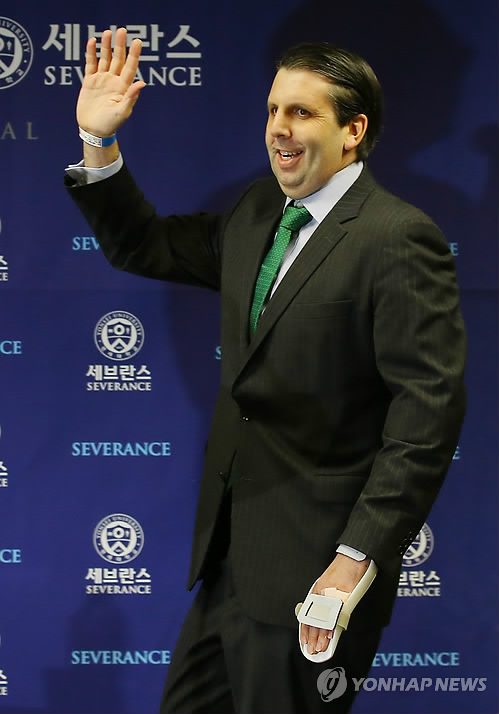- S. Korea unveils first graphic cigarette warnings
- US joins with South Korea, Japan in bid to deter North Korea
- LPGA golfer Chun In-gee finally back in action
- S. Korea won’t be top seed in final World Cup qualification round
- US men’s soccer misses 2nd straight Olympics
- US back on track in qualifying with 4-0 win over Guatemala
- High-intensity workout injuries spawn cottage industry
- CDC expands range of Zika mosquitoes into parts of Northeast
- Who knew? ‘The Walking Dead’ is helping families connect
- California Assembly OKs highest minimum wage in nation
US Ambassador to Seoul leaves hospital after attack, feeling ‘darn good’

U.S. ambassador Mark Lippert attends a news conference at Severance Hospital in Seoul on March 10, 2015, prior to being released from the hospital. He underwent surgery to his face and arm for injuries inflicted by a knife-wielding, anti-U.S. activist at an event in Seoul on March 5. (Yonhap)
SEOUL, March 10 (Yonhap) — U.S. Ambassador to South Korea Mark Lippert was released from a Seoul hospital on Tuesday, five days after he was knifed by a South Korean nationalist, saying he felt “darn good.”
Speaking to reporters at Yonsei University’s Severance Hospital, Lippert, 42, said he expects to make a full recovery and return to work “as soon as possible” and expressed his “profound gratitude” for the overwhelming support he received from South Koreans and Americans alike.
In a shocking attack on Thursday, Lippert was slashed on his face and wrist by a knife-wielding South Korean man who attacked him at a breakfast function in downtown Seoul. The attack left Lippert with wounds that required 80 stitches.
The 55-year-old attacker, Kim Ki-jong, was arrested at the scene and has been detained on various charges, including attempted murder.
“I feel pretty darn good all things considered,” Lippert told reporters before he left the hospital. “I want to express my profound gratitude to those Koreans and Americans alike who so bravely, gratefully and selflessly responded to the scene of the attack and the medical team that delivered a world-class treatment.”
With bandages on his face and his left arm in a brace, Lippert stressed that relations between South Korea and the U.S. will remain as strong as ever, as officials from both countries have already agreed.
“This incident has only strengthened our love and affection for this country and our belief in the unbreakable bond that exists between the United States and the Republic of Korea,” he said.
Lippert refused to discuss the security situation at the time of the attack, citing U.S. national security concerns. He also denied commenting on the incident itself, saying he needed to talk to law enforcement officials first.
The ambassador, however, said he will still be a “dongne ajeossi” and “Sejuni appa,” referring to his Korean nicknames, roughly translated as “a dude in the neighborhood” and “Sejun’s dad.” Sejun is the Korean middle name Lippert gave to his son, who was born here in January.
Lippert, the youngest U.S. ambassador to South Korea, took up his post in October.
“The land hardens after the rain,” the envoy also said in Korean. The expression is the Korean equivalent of “What doesn’t kill you makes you stronger.”
“Gachi gapshida,” he said, wrapping up the press conference. The phrase means “Let’s go together.” He had said the same on his Twitter account in the immediate aftermath of the incident.
Hospital officials said he will continue to receive treatment from home.
Jung Nam-shik, head of the Yonsei University Health System, said the wounds on Lippert’s left arm will require regular sterilization to prevent infection. The ambassador continued to experience pain in his left wrist, but it was manageable with a mild painkiller, Jung added.
Kim, the suspect in the case, told police officers he assaulted the ambassador to alert the U.S. to “the fact that it hinders inter-Korean reunification.” He denies having meant to murder the envoy.
South Korea remains technically at war with rival North Korea, with the U.S. stationing more than 28,000 troops here to deter North Korean aggression. Hard-core nationalists here argue that the U.S. gets in the way of Korean reunification, as Pyongyang considers U.S. troops here threatening.
Kim broke his right ankle when authorities overpowered him on Friday and will undergo surgery at the National Police Hospital this afternoon. Police said the interrogation will continue at the hospital.
Police are continuing their probe to determine whether Kim has violated a controversial security law that bans people from openly praising North Korea.
Kim was already found to have traveled to the North seven times between 1999 and 2007. He also tried to erect an altar in the heart of Seoul that honors late North Korean leader Kim Jong-il in 2011, according to authorities.
About a dozen books were recently found in Kim’s home that are suspected of being dangerously pro-North Korea in nature, including “On the Art of Cinema” written by Kim Jong-il.
Possession of pro-North Korea books alone would not be sufficient to charge Kim with violating the National Security Law. Authorities would need to prove that Kim tried to threaten national security or destabilize South Korea’s democratic order with these materials.
Kim reportedly told officers he considers North Korean founder Kim Il-sung a “great leader of the 20th century” with no leader in South Korea coming close.
Meanwhile, police have apprehended a 71-year-old man who allegedly called in a phone treat to YTN, a local cable news channel, earlier Thursday to protest the TV showing of Lippert’s injured face.
The man, identified only by his surname Song, allegedly called to say he would blow up the YTN headquarters if the channel continued to show Lippert’s injured face on TV.
Song reportedly said he had made several such requests before and would not tolerate another display of Lippert’s injury.
He was arrested near Seoul’s YTN headquarters about six hours after the call was made. Police are investigating his motive.
















